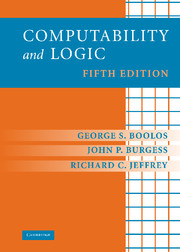Book contents
- Frontmatter
- Contents
- Preface to the Fifth Edition
- COMPUTABILITY THEORY
- BASIC METALOGIC
- 9 A Précis of First-Order Logic: Syntax
- 10 A Précis of First-Order Logic: Semantics
- 11 The Undecidability of First-Order Logic
- 12 Models
- 13 The Existence of Models
- 14 Proofs and Completeness
- 15 Arithmetization
- 16 Representability of Recursive Functions
- 17 Indefinability, Undecidability, Incompleteness
- 18 The Unprovability of Consistency
- FURTHER TOPICS
- Annotated Bibliography
- Index
16 - Representability of Recursive Functions
Published online by Cambridge University Press: 05 June 2012
- Frontmatter
- Contents
- Preface to the Fifth Edition
- COMPUTABILITY THEORY
- BASIC METALOGIC
- 9 A Précis of First-Order Logic: Syntax
- 10 A Précis of First-Order Logic: Semantics
- 11 The Undecidability of First-Order Logic
- 12 Models
- 13 The Existence of Models
- 14 Proofs and Completeness
- 15 Arithmetization
- 16 Representability of Recursive Functions
- 17 Indefinability, Undecidability, Incompleteness
- 18 The Unprovability of Consistency
- FURTHER TOPICS
- Annotated Bibliography
- Index
Summary
In the preceding chapter we connected our work on recursion with our work on formulas and proofs in one way, by showing that various functions associated with formulas and proofs are recursive. In this chapter we connect the two topics in the opposite way, by showing how we can ‘talk about’ recursive functions using formulas, and prove things about them in theories formulated in the language of arithmetic. In section 16.1 we show that for any recursive function f, we can find a formula φf such that for any natural numbers a and b, if f(a) = b then ∀y(φf (a, y) ↔ y = b) will be true in the standard interpretation of the language of arithmetic. In section 16.2 we strengthen this result, by introducing a theory Q of minimal arithmetic, and showing that for any recursive function f, we can find a formula ψf such that for any natural numbers a and b, if f(a) = b then ∀y(ψf (a, y) ↔ y =b) will be not merely true, but provable in Q. In section 16.3 we briefly introduce a stronger theory P of Peano arithmetic, which includes axioms of mathematical induction, and explain how these axioms enable us to prove results not obtainable in Q. The brief, optional section 16.4 is an appendix for readers interested in comparing our treatment of these matters here with other treatments in the literature.
- Type
- Chapter
- Information
- Computability and Logic , pp. 199 - 219Publisher: Cambridge University PressPrint publication year: 2007



